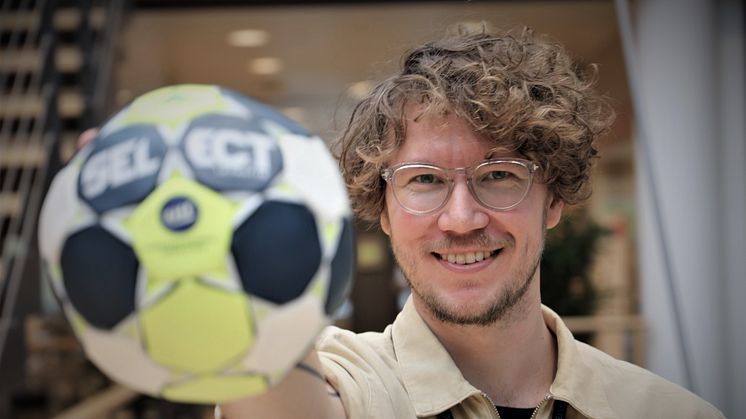
Blog post -
Misunderstandings in a culture of clarity
In a new research project, anthropologist Kasper Pape Helligsøe sets out to explore the social and cultural conditions at Systematic and the professional handball club Bjerringbro-Silkeborg (BSH). The aim is to generate new knowledge about how organizations maintain and develop high-level performance environments. In this blog, he wonders whether the clarity and attention to detail at BSH could inspire teams at Systematic.
I had been waiting eagerly for my first day of fieldwork to arrive. This was the culmination of three months of reading dusty academic books and worrying about whether the project was clever enough -- whether I was. Six months earlier when I first heard about the PhD project which would later become my PhD project, I was puzzled by the strange idea of comparing a professional handball club to an international software company. What could possibly be the benefit of that?
To be completely honest, I still struggle with this question on my less confident days. When people ask, I usually explain how insights from the handball club will shed new light on the ways that leaders and employees at Systematic work with high performance, leadership and team culture. And I believe they will! As with any research that hasn’t been done before, however, it all remains to be seen.
Handball players are rarely doubtful about their roles
It was with equal parts anticipation and anxiety, I walked into the handball arena on my first day of fieldwork. My palms were sweaty as I introduced myself and my project to the players. Some looked bored, others confused and a few genuinely interested. For obvious reasons, I couldn’t participate in the actual handball training, so I spent the day chit chatting with players and staff in between sessions and exercises. After training, Peter Bredsdorff, the head coach, wanted to talk to me. He sounded serious.
“You can’t talk to the players during training,” he said. “That is not going to work! I know you are curious and want data for your project, but the players need to be 100 percent focused on training. Don’t take it as a critique. It’s just to say that we don’t do this to have fun. Our livelihood depends upon winning handball matches!”
Feeling a bit like a school child who had been reprimanded, I silently cursed myself for messing up this important day.
I did eventually find the balance between being present and staying in the background. Anthropological fieldwork is all about building relations and as soon as I came to know the players, there were plenty of moments to talk before and after trainings, meetings and matches. One of the things that immediately stands out at Bjerringbro-Silkeborg, is the very high degree of clarity that runs through most activities in and around the handball team.
The players are rarely doubtful about their roles, their tasks or the quality of their work. There are several reasons for that. One being the way their work is structured on the training pitch. The amount of time passing from players are assigned a task, execute it and receive feedback is extremely limited. It all happens within a few minutes. This has the effect of instantly shedding light on any misunderstandings regarding the task at hand. If a player misinterprets a task his placement might be wrong, the coach will see this and let him know, and the misunderstanding will be corrected within 30 seconds.
In a way, that’s also what happened after my first day at the club. I had obviously misunderstood my level of involvement during training sessions. Peter immediately let me know and corrected the misunderstanding. He doesn’t mince his words. That is one of the things contributing to what you might call a culture of clarity at Bjerringbro-Silkeborg.
"Nothing is unimportant"
Another important aspect of this culture is the extreme attention to detail I observed at many occasions in my time at the handball club. To give you an idea, I want to share a story about the edges of the table in the team’s new changing room. The narrow table is fixed to a wall in the oblong room. In the days after the table was installed, they weren’t altogether happy about it. One of the players suggested to grind down and soften the edges, making them round and soft rather than sharp. Peter agreed. The player brought some tools to the changing room and did it himself. I asked Peter why it mattered whether the edges were sharp or round. Why spent time on something that seemed unimportant?
“Nothing is unimportant,” he said, and went on to tell me how they always strived to do the best they could in everything concerning the team. Not just on the handball pitch. “If the edges of the table are important,” he explained, “then a lot of other things are too. If they are unimportant, on the other hand, then it might also be unimportant whether the coffee is any good, the seats in our bus comfortable or whether we meet on time or not. Unimportance, to my mind, is a symptom of inattention and lack of engagement and I do not accept that.”
I was fascinated. This is quite an extreme way of approaching one’s work life. With excessive attention to detail believing that everything you do is connected to how well you perform. In that sense, it is not about the edges of the table, it is about what the grinding of them represents. A mindset, a culture, a way of approaching the world almost. I wonder whether this approach could inspire teams at Systematic? After all, the circumstances are completely different. The level of complexity and time available does not lend itself to such scrutiny of details. But what if this scrutiny was consciously applied to only aspects of a team’s work? Aspects that the team members are currently struggling with. Could teams at Systematic successfully use the insights from the handball club to reflect upon their own practice -- their level of clarity and attention to detail for example? I will have to get back to you on that.

